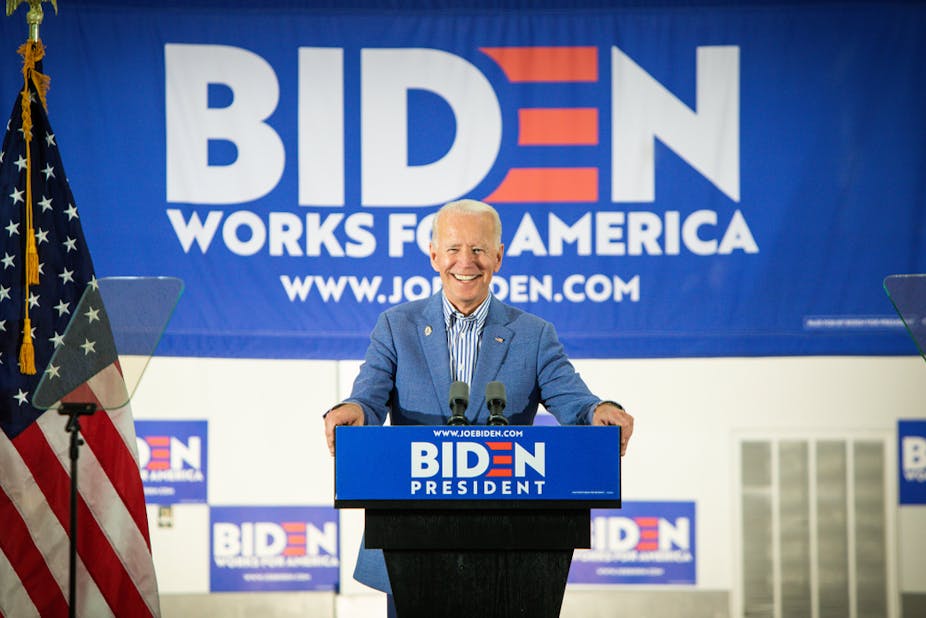Joe Biden, who served as vice-president during the Barack Obama years, has run for the US presidency three times – in 1988, 2008 and now. And each time he announces a White House bid, commentators revisit his ill-fated 1988 run. Famously, in September 1987, the then Delaware senator withdrew from the Democratic race eventually won by Michael Dukakis, admitting he had been “cocky”, “immature” and “naïve” about the rigours of running for the highest office on Earth.
The cause for that decision is well-known: Biden had borrowed some speech lines from the then British Labour Party leader Neil Kinnock, but failed to reference his source enough times, leading the media to suspect plagiarism. It was a scandal, as the journalist Ezra Klein notes, that “threatened to engulf … his career”.
What is less well-known, and is discussed in my forthcoming book March of the Moderates, however, is what happened next.
In January 1988, Biden visited a cold London. Although he also had a cordial meeting with Conservative prime minister Margaret Thatcher, he went out of his way to request time with Kinnock – and asked that no press be present. Kinnock later recalled that “in good fun, Joe took the occasion on visiting me in the House of Commons to give me a small collection of his own speeches on foreign policy”.
Biden had obviously meant this gesture as a joke, but “in fact, [Kinnock] took the occasion to read several of them – on arms control, [the] Star Wars [missile system], and US-Soviet relations”. The Welsh politician “found them instructive and beautifully stated”. Labour’s leader admitted that he would be looking to follow the kind of “tough-minded internationalist foreign policy” Biden had long called for.
During the trip to Europe, Biden had taken along his teenage son, Beau – who later tragically died of brain cancer at just 46 after serving as Delaware’s attorney general. Kinnock remembers that “his son was in his late teens, and very dismayed with his old man for standing down from the race”.
Kinnock had a few words with Beau and said “exactly what had happened. Joe shouldn’t be ashamed in any way, and he shouldn’t be ashamed of his father who as far as I’m concerned was a distinguished and admirable member of the US Senate – who had overcome all kinds of appalling personal difficulties”.

Joe Biden, Kinnock recalled, expressed his clear gratitude at these comments, and a friendship was forged. The two were in contact through most of their subsequent career ups and downs and, in 1997, Biden even jovially wrote to tell Kinnock he was “still a hero with my wife, sister and mother”.
Kinnock’s legacy
This sentiment was true for many. Kinnock was a brave figure who, though never prime minister, saved his party from electoral extinction. He had begun on the radical British left (including adopting its position against Britain remaining in the European Economic Community in the original 1975 referendum), but had shed such discourse by the 1980s.
There was nothing unusual in this – even later moderates such as future UK prime minister Tony Blair and chancellor Gordon Brown had learned to mouth the words of the left on other issues when seeking a route into parliament. The key was to make the journey to the mainstream centre, and, as current Labour leader Jeremy Corbyn would prove, not every politician did.
As my book argues, there would have been no New Labour, and thus no successful partnership between Tony Blair and Democrat US president Bill Clinton in the late 1990s, without Neil Kinnock – or the work of equivalent transitional figures in the US such as Dick Gephardt. Fighting the US Jesse Jacksons and the UK Tony Benns took strength in the face of such radicals’ rhetorical gifts. As such, back in 1988, Kinnock had told Biden not to “take notice of marginal zany propositions” from the more eccentric Labour MPs he might see in the British newspapers. After all, they would not provide the path back to power.
Thanks to the efforts of politicians like Kinnock, however, the tide was beginning to turn. By the time he met Biden, Kinnock’s American contact book stretched not only to the later vice-president, but other moderate and conservative Democrats such as Gary Hart, Sam Nunn and Pat Moynihan. Through meeting such figures and discussing ideas, the space was slowly being teased out for the type of “opportunity, responsibility and community” agenda that Bill Clinton would get over the electoral line in the 1992 presidential election.
There were differences between Clinton and Kinnock, of course, but the point was the latter got the electoral ball rolling. After his 1997 landslide New Labour victory, Tony Blair would seek to build on the achievements of both.
Biden will be looking for his own victory in the coming year. There will be many twists and turns in the race for the Democratic nomination – and endless debates, rightly, over the historic record of each candidate. But it is time to put the Kinnock plagiarism episode to bed. If anything, its aftermath – renewed cooperation between Anglo-American moderates – is of greater long-term relevance than the initial furore.

